A Review of Challenges in Knowledge Engineering for Healthcare Systems
VerifiedAdded on 2023/04/08
|11
|2435
|393
Report
AI Summary
This report provides a comprehensive overview of the challenges in knowledge engineering within the healthcare sector. It begins with an abstract defining knowledge engineering and highlighting the growing demand for knowledge-based systems in modern healthcare. The report delves into the significant challenges faced due to the absence of these systems, emphasizing the critical role of professional experience and the impact of chronic diseases on the need for advanced knowledge management. It explores the definition of knowledge engineering, its application in healthcare, and the benefits of knowledge-based systems, such as improved response times, enhanced quality of service delivery, and cost-effectiveness. The report also investigates the advantages of knowledge-based systems, including improved decision-making, and the use of technology to integrate information access. It concludes by emphasizing the importance of knowledge engineering solutions, such as standardized procedures and training, to prevent errors and improve patient outcomes, while also addressing the challenges in decision-making processes and knowledge acquisition. The report provides a critical analysis of the impact of knowledge engineering on the healthcare sector, and discusses the role of knowledge management in improving patient care, streamlining health services, and optimizing healthcare processes.
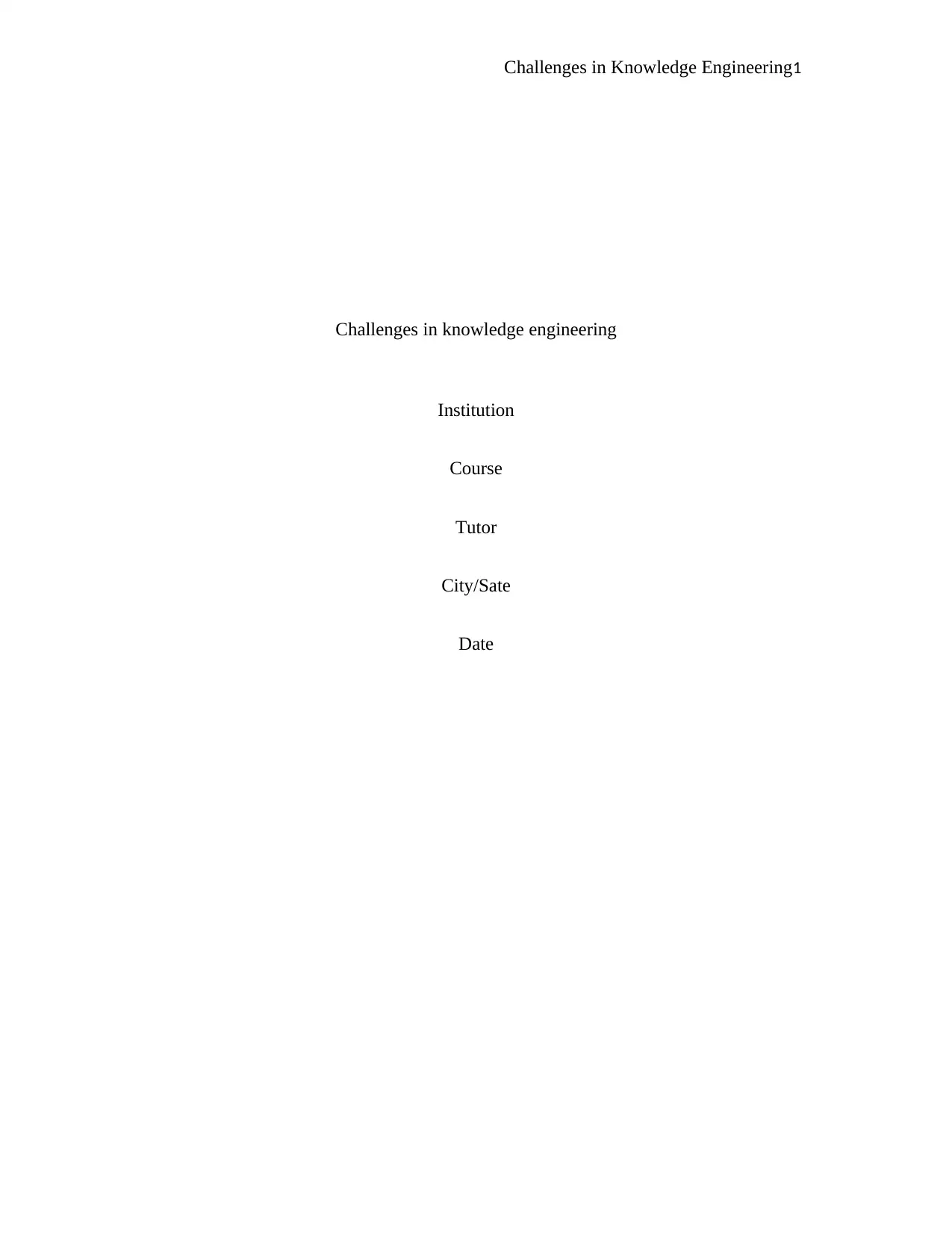
Challenges in Knowledge Engineering1
Challenges in knowledge engineering
Institution
Course
Tutor
City/Sate
Date
Challenges in knowledge engineering
Institution
Course
Tutor
City/Sate
Date
Paraphrase This Document
Need a fresh take? Get an instant paraphrase of this document with our AI Paraphraser
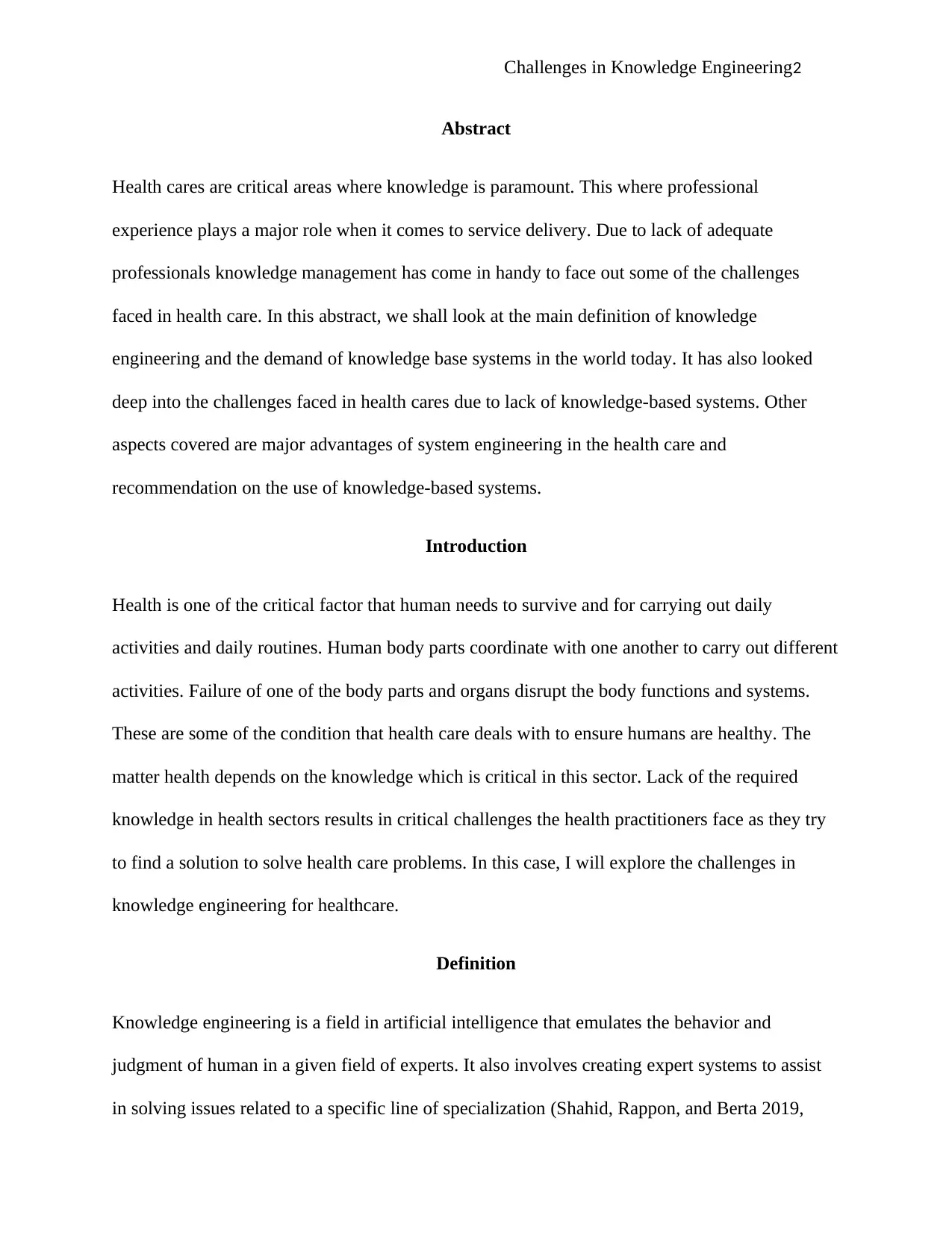
Challenges in Knowledge Engineering2
Abstract
Health cares are critical areas where knowledge is paramount. This where professional
experience plays a major role when it comes to service delivery. Due to lack of adequate
professionals knowledge management has come in handy to face out some of the challenges
faced in health care. In this abstract, we shall look at the main definition of knowledge
engineering and the demand of knowledge base systems in the world today. It has also looked
deep into the challenges faced in health cares due to lack of knowledge-based systems. Other
aspects covered are major advantages of system engineering in the health care and
recommendation on the use of knowledge-based systems.
Introduction
Health is one of the critical factor that human needs to survive and for carrying out daily
activities and daily routines. Human body parts coordinate with one another to carry out different
activities. Failure of one of the body parts and organs disrupt the body functions and systems.
These are some of the condition that health care deals with to ensure humans are healthy. The
matter health depends on the knowledge which is critical in this sector. Lack of the required
knowledge in health sectors results in critical challenges the health practitioners face as they try
to find a solution to solve health care problems. In this case, I will explore the challenges in
knowledge engineering for healthcare.
Definition
Knowledge engineering is a field in artificial intelligence that emulates the behavior and
judgment of human in a given field of experts. It also involves creating expert systems to assist
in solving issues related to a specific line of specialization (Shahid, Rappon, and Berta 2019,
Abstract
Health cares are critical areas where knowledge is paramount. This where professional
experience plays a major role when it comes to service delivery. Due to lack of adequate
professionals knowledge management has come in handy to face out some of the challenges
faced in health care. In this abstract, we shall look at the main definition of knowledge
engineering and the demand of knowledge base systems in the world today. It has also looked
deep into the challenges faced in health cares due to lack of knowledge-based systems. Other
aspects covered are major advantages of system engineering in the health care and
recommendation on the use of knowledge-based systems.
Introduction
Health is one of the critical factor that human needs to survive and for carrying out daily
activities and daily routines. Human body parts coordinate with one another to carry out different
activities. Failure of one of the body parts and organs disrupt the body functions and systems.
These are some of the condition that health care deals with to ensure humans are healthy. The
matter health depends on the knowledge which is critical in this sector. Lack of the required
knowledge in health sectors results in critical challenges the health practitioners face as they try
to find a solution to solve health care problems. In this case, I will explore the challenges in
knowledge engineering for healthcare.
Definition
Knowledge engineering is a field in artificial intelligence that emulates the behavior and
judgment of human in a given field of experts. It also involves creating expert systems to assist
in solving issues related to a specific line of specialization (Shahid, Rappon, and Berta 2019,
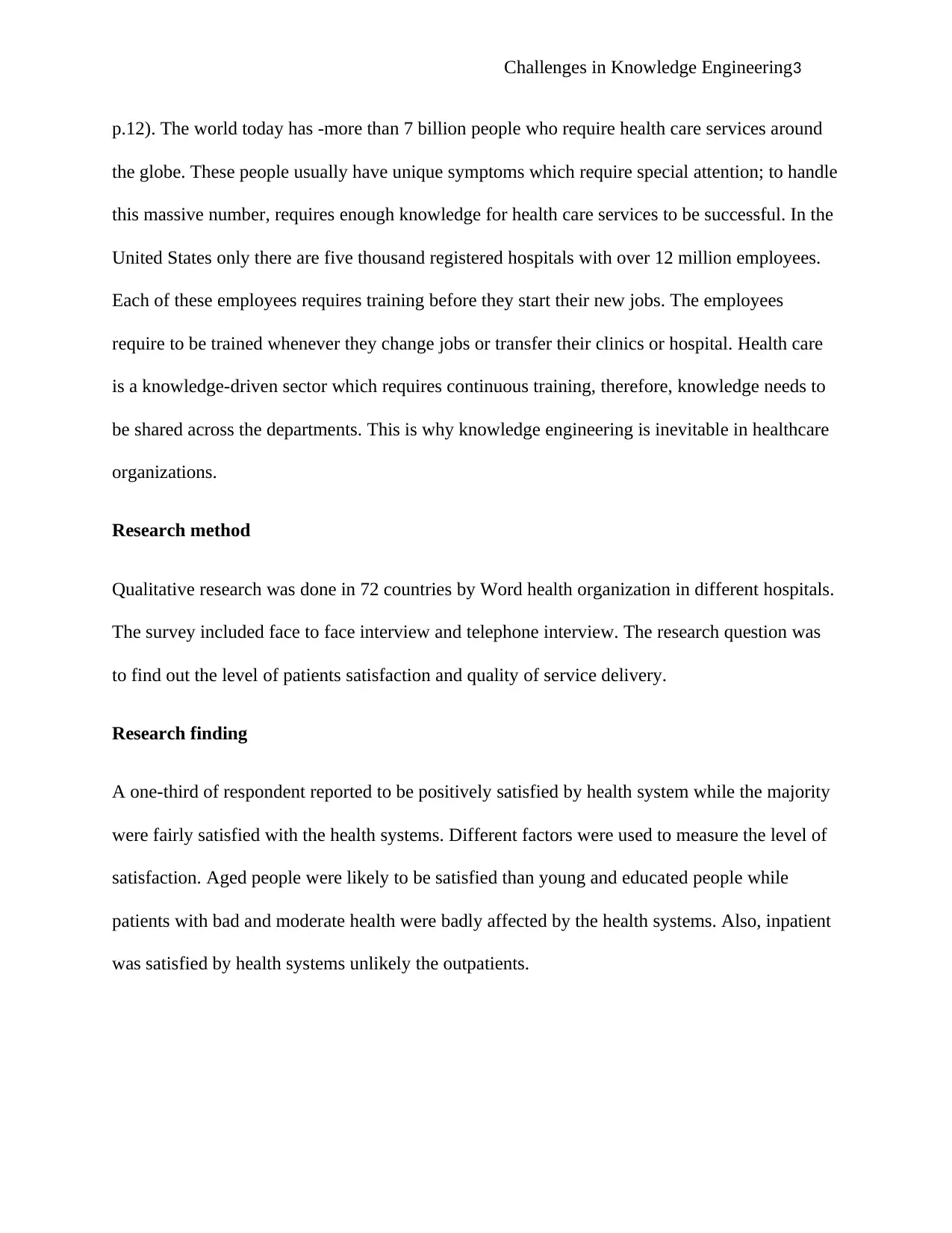
Challenges in Knowledge Engineering3
p.12). The world today has -more than 7 billion people who require health care services around
the globe. These people usually have unique symptoms which require special attention; to handle
this massive number, requires enough knowledge for health care services to be successful. In the
United States only there are five thousand registered hospitals with over 12 million employees.
Each of these employees requires training before they start their new jobs. The employees
require to be trained whenever they change jobs or transfer their clinics or hospital. Health care
is a knowledge-driven sector which requires continuous training, therefore, knowledge needs to
be shared across the departments. This is why knowledge engineering is inevitable in healthcare
organizations.
Research method
Qualitative research was done in 72 countries by Word health organization in different hospitals.
The survey included face to face interview and telephone interview. The research question was
to find out the level of patients satisfaction and quality of service delivery.
Research finding
A one-third of respondent reported to be positively satisfied by health system while the majority
were fairly satisfied with the health systems. Different factors were used to measure the level of
satisfaction. Aged people were likely to be satisfied than young and educated people while
patients with bad and moderate health were badly affected by the health systems. Also, inpatient
was satisfied by health systems unlikely the outpatients.
p.12). The world today has -more than 7 billion people who require health care services around
the globe. These people usually have unique symptoms which require special attention; to handle
this massive number, requires enough knowledge for health care services to be successful. In the
United States only there are five thousand registered hospitals with over 12 million employees.
Each of these employees requires training before they start their new jobs. The employees
require to be trained whenever they change jobs or transfer their clinics or hospital. Health care
is a knowledge-driven sector which requires continuous training, therefore, knowledge needs to
be shared across the departments. This is why knowledge engineering is inevitable in healthcare
organizations.
Research method
Qualitative research was done in 72 countries by Word health organization in different hospitals.
The survey included face to face interview and telephone interview. The research question was
to find out the level of patients satisfaction and quality of service delivery.
Research finding
A one-third of respondent reported to be positively satisfied by health system while the majority
were fairly satisfied with the health systems. Different factors were used to measure the level of
satisfaction. Aged people were likely to be satisfied than young and educated people while
patients with bad and moderate health were badly affected by the health systems. Also, inpatient
was satisfied by health systems unlikely the outpatients.
⊘ This is a preview!⊘
Do you want full access?
Subscribe today to unlock all pages.

Trusted by 1+ million students worldwide
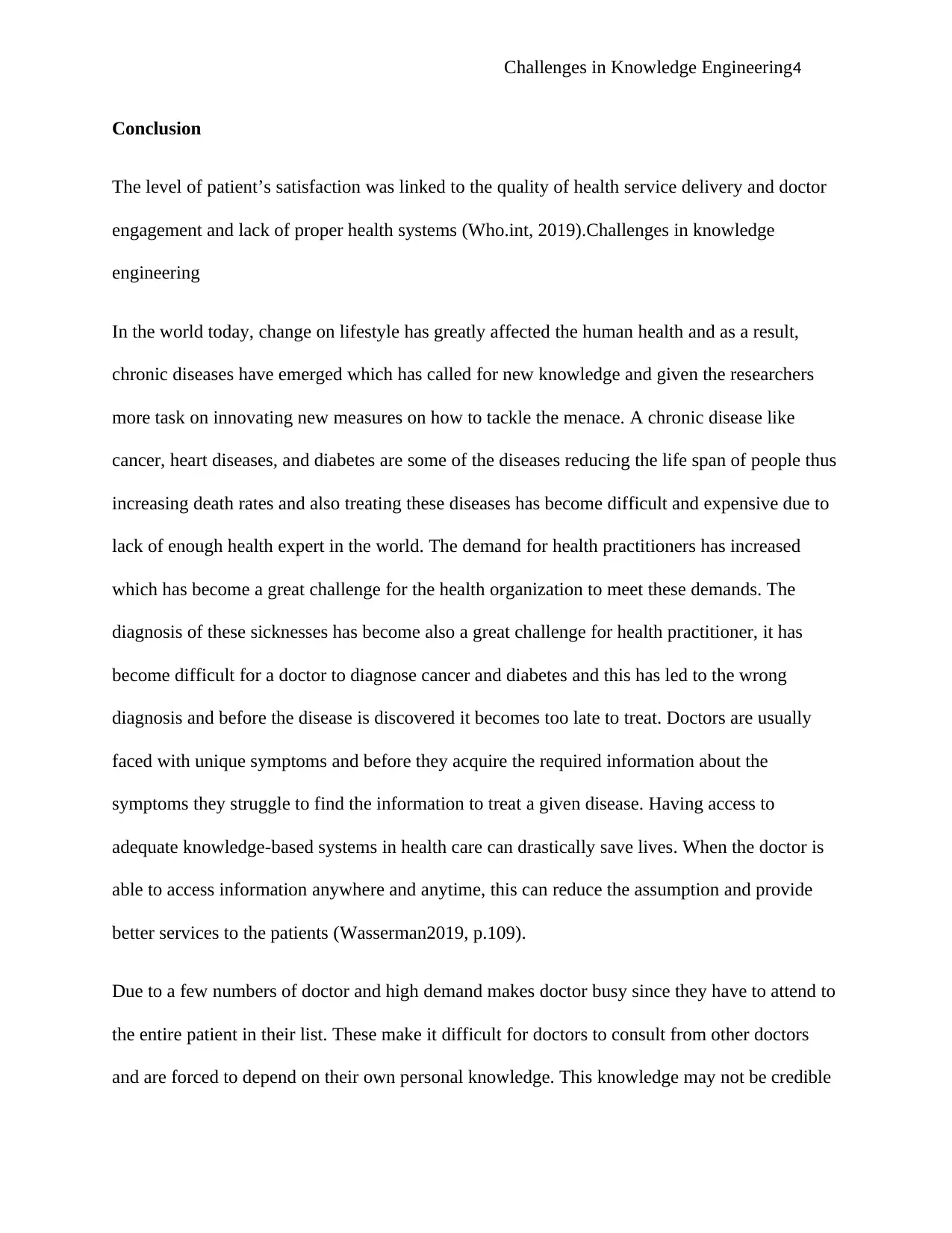
Challenges in Knowledge Engineering4
Conclusion
The level of patient’s satisfaction was linked to the quality of health service delivery and doctor
engagement and lack of proper health systems (Who.int, 2019).Challenges in knowledge
engineering
In the world today, change on lifestyle has greatly affected the human health and as a result,
chronic diseases have emerged which has called for new knowledge and given the researchers
more task on innovating new measures on how to tackle the menace. A chronic disease like
cancer, heart diseases, and diabetes are some of the diseases reducing the life span of people thus
increasing death rates and also treating these diseases has become difficult and expensive due to
lack of enough health expert in the world. The demand for health practitioners has increased
which has become a great challenge for the health organization to meet these demands. The
diagnosis of these sicknesses has become also a great challenge for health practitioner, it has
become difficult for a doctor to diagnose cancer and diabetes and this has led to the wrong
diagnosis and before the disease is discovered it becomes too late to treat. Doctors are usually
faced with unique symptoms and before they acquire the required information about the
symptoms they struggle to find the information to treat a given disease. Having access to
adequate knowledge-based systems in health care can drastically save lives. When the doctor is
able to access information anywhere and anytime, this can reduce the assumption and provide
better services to the patients (Wasserman2019, p.109).
Due to a few numbers of doctor and high demand makes doctor busy since they have to attend to
the entire patient in their list. These make it difficult for doctors to consult from other doctors
and are forced to depend on their own personal knowledge. This knowledge may not be credible
Conclusion
The level of patient’s satisfaction was linked to the quality of health service delivery and doctor
engagement and lack of proper health systems (Who.int, 2019).Challenges in knowledge
engineering
In the world today, change on lifestyle has greatly affected the human health and as a result,
chronic diseases have emerged which has called for new knowledge and given the researchers
more task on innovating new measures on how to tackle the menace. A chronic disease like
cancer, heart diseases, and diabetes are some of the diseases reducing the life span of people thus
increasing death rates and also treating these diseases has become difficult and expensive due to
lack of enough health expert in the world. The demand for health practitioners has increased
which has become a great challenge for the health organization to meet these demands. The
diagnosis of these sicknesses has become also a great challenge for health practitioner, it has
become difficult for a doctor to diagnose cancer and diabetes and this has led to the wrong
diagnosis and before the disease is discovered it becomes too late to treat. Doctors are usually
faced with unique symptoms and before they acquire the required information about the
symptoms they struggle to find the information to treat a given disease. Having access to
adequate knowledge-based systems in health care can drastically save lives. When the doctor is
able to access information anywhere and anytime, this can reduce the assumption and provide
better services to the patients (Wasserman2019, p.109).
Due to a few numbers of doctor and high demand makes doctor busy since they have to attend to
the entire patient in their list. These make it difficult for doctors to consult from other doctors
and are forced to depend on their own personal knowledge. This knowledge may not be credible
Paraphrase This Document
Need a fresh take? Get an instant paraphrase of this document with our AI Paraphraser
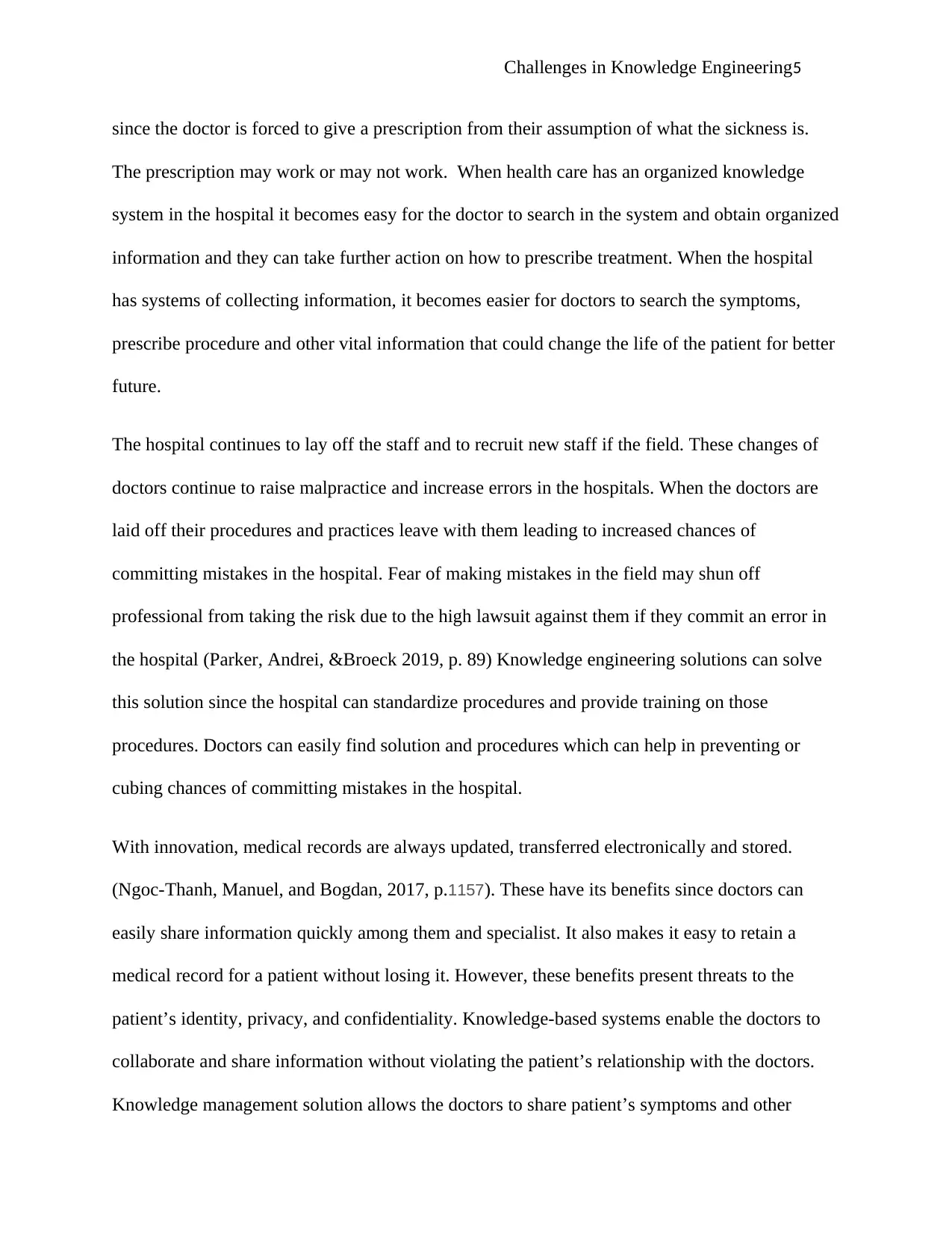
Challenges in Knowledge Engineering5
since the doctor is forced to give a prescription from their assumption of what the sickness is.
The prescription may work or may not work. When health care has an organized knowledge
system in the hospital it becomes easy for the doctor to search in the system and obtain organized
information and they can take further action on how to prescribe treatment. When the hospital
has systems of collecting information, it becomes easier for doctors to search the symptoms,
prescribe procedure and other vital information that could change the life of the patient for better
future.
The hospital continues to lay off the staff and to recruit new staff if the field. These changes of
doctors continue to raise malpractice and increase errors in the hospitals. When the doctors are
laid off their procedures and practices leave with them leading to increased chances of
committing mistakes in the hospital. Fear of making mistakes in the field may shun off
professional from taking the risk due to the high lawsuit against them if they commit an error in
the hospital (Parker, Andrei, &Broeck 2019, p. 89) Knowledge engineering solutions can solve
this solution since the hospital can standardize procedures and provide training on those
procedures. Doctors can easily find solution and procedures which can help in preventing or
cubing chances of committing mistakes in the hospital.
With innovation, medical records are always updated, transferred electronically and stored.
(Ngoc-Thanh, Manuel, and Bogdan, 2017, p.1157). These have its benefits since doctors can
easily share information quickly among them and specialist. It also makes it easy to retain a
medical record for a patient without losing it. However, these benefits present threats to the
patient’s identity, privacy, and confidentiality. Knowledge-based systems enable the doctors to
collaborate and share information without violating the patient’s relationship with the doctors.
Knowledge management solution allows the doctors to share patient’s symptoms and other
since the doctor is forced to give a prescription from their assumption of what the sickness is.
The prescription may work or may not work. When health care has an organized knowledge
system in the hospital it becomes easy for the doctor to search in the system and obtain organized
information and they can take further action on how to prescribe treatment. When the hospital
has systems of collecting information, it becomes easier for doctors to search the symptoms,
prescribe procedure and other vital information that could change the life of the patient for better
future.
The hospital continues to lay off the staff and to recruit new staff if the field. These changes of
doctors continue to raise malpractice and increase errors in the hospitals. When the doctors are
laid off their procedures and practices leave with them leading to increased chances of
committing mistakes in the hospital. Fear of making mistakes in the field may shun off
professional from taking the risk due to the high lawsuit against them if they commit an error in
the hospital (Parker, Andrei, &Broeck 2019, p. 89) Knowledge engineering solutions can solve
this solution since the hospital can standardize procedures and provide training on those
procedures. Doctors can easily find solution and procedures which can help in preventing or
cubing chances of committing mistakes in the hospital.
With innovation, medical records are always updated, transferred electronically and stored.
(Ngoc-Thanh, Manuel, and Bogdan, 2017, p.1157). These have its benefits since doctors can
easily share information quickly among them and specialist. It also makes it easy to retain a
medical record for a patient without losing it. However, these benefits present threats to the
patient’s identity, privacy, and confidentiality. Knowledge-based systems enable the doctors to
collaborate and share information without violating the patient’s relationship with the doctors.
Knowledge management solution allows the doctors to share patient’s symptoms and other
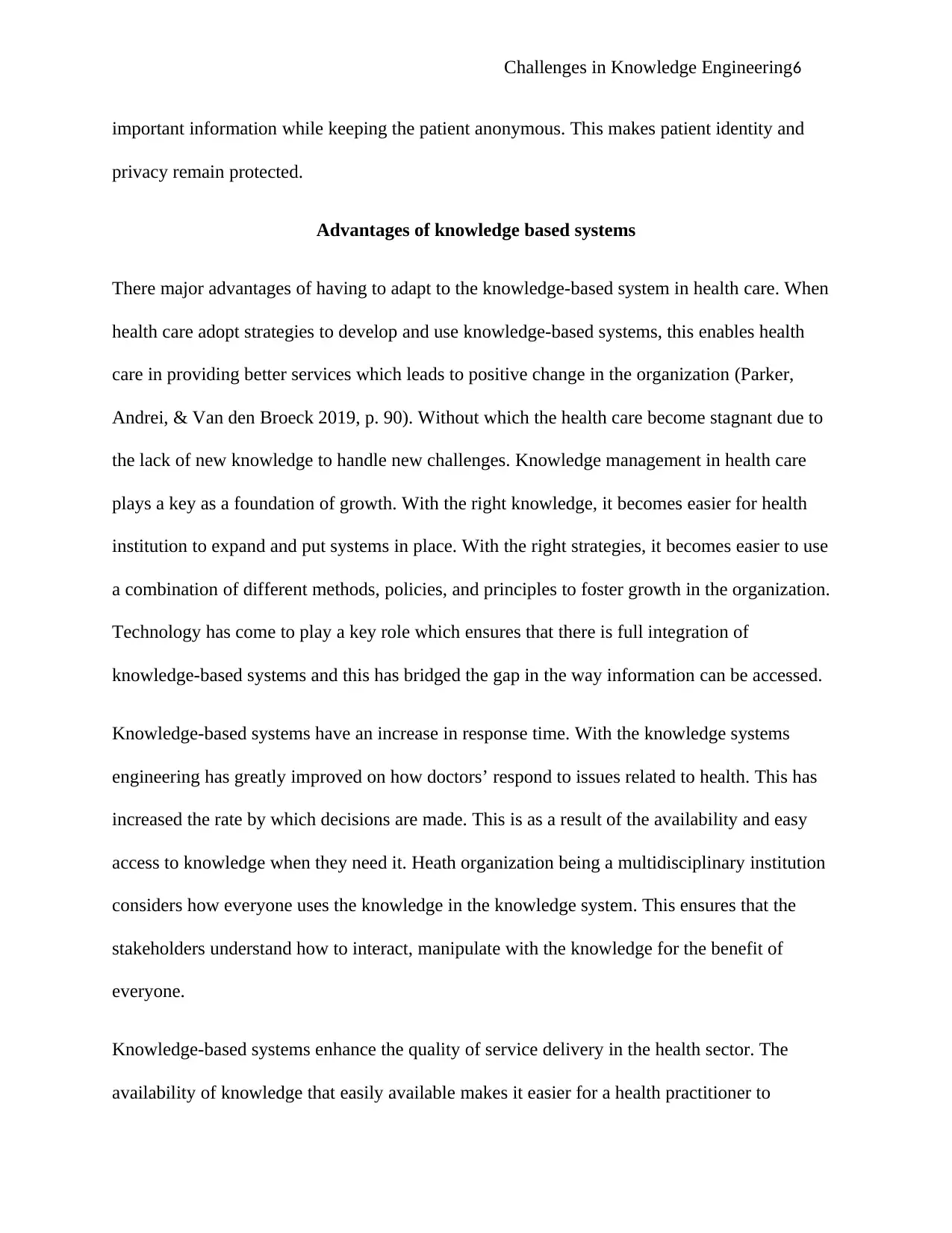
Challenges in Knowledge Engineering6
important information while keeping the patient anonymous. This makes patient identity and
privacy remain protected.
Advantages of knowledge based systems
There major advantages of having to adapt to the knowledge-based system in health care. When
health care adopt strategies to develop and use knowledge-based systems, this enables health
care in providing better services which leads to positive change in the organization (Parker,
Andrei, & Van den Broeck 2019, p. 90). Without which the health care become stagnant due to
the lack of new knowledge to handle new challenges. Knowledge management in health care
plays a key as a foundation of growth. With the right knowledge, it becomes easier for health
institution to expand and put systems in place. With the right strategies, it becomes easier to use
a combination of different methods, policies, and principles to foster growth in the organization.
Technology has come to play a key role which ensures that there is full integration of
knowledge-based systems and this has bridged the gap in the way information can be accessed.
Knowledge-based systems have an increase in response time. With the knowledge systems
engineering has greatly improved on how doctors’ respond to issues related to health. This has
increased the rate by which decisions are made. This is as a result of the availability and easy
access to knowledge when they need it. Heath organization being a multidisciplinary institution
considers how everyone uses the knowledge in the knowledge system. This ensures that the
stakeholders understand how to interact, manipulate with the knowledge for the benefit of
everyone.
Knowledge-based systems enhance the quality of service delivery in the health sector. The
availability of knowledge that easily available makes it easier for a health practitioner to
important information while keeping the patient anonymous. This makes patient identity and
privacy remain protected.
Advantages of knowledge based systems
There major advantages of having to adapt to the knowledge-based system in health care. When
health care adopt strategies to develop and use knowledge-based systems, this enables health
care in providing better services which leads to positive change in the organization (Parker,
Andrei, & Van den Broeck 2019, p. 90). Without which the health care become stagnant due to
the lack of new knowledge to handle new challenges. Knowledge management in health care
plays a key as a foundation of growth. With the right knowledge, it becomes easier for health
institution to expand and put systems in place. With the right strategies, it becomes easier to use
a combination of different methods, policies, and principles to foster growth in the organization.
Technology has come to play a key role which ensures that there is full integration of
knowledge-based systems and this has bridged the gap in the way information can be accessed.
Knowledge-based systems have an increase in response time. With the knowledge systems
engineering has greatly improved on how doctors’ respond to issues related to health. This has
increased the rate by which decisions are made. This is as a result of the availability and easy
access to knowledge when they need it. Heath organization being a multidisciplinary institution
considers how everyone uses the knowledge in the knowledge system. This ensures that the
stakeholders understand how to interact, manipulate with the knowledge for the benefit of
everyone.
Knowledge-based systems enhance the quality of service delivery in the health sector. The
availability of knowledge that easily available makes it easier for a health practitioner to
⊘ This is a preview!⊘
Do you want full access?
Subscribe today to unlock all pages.

Trusted by 1+ million students worldwide
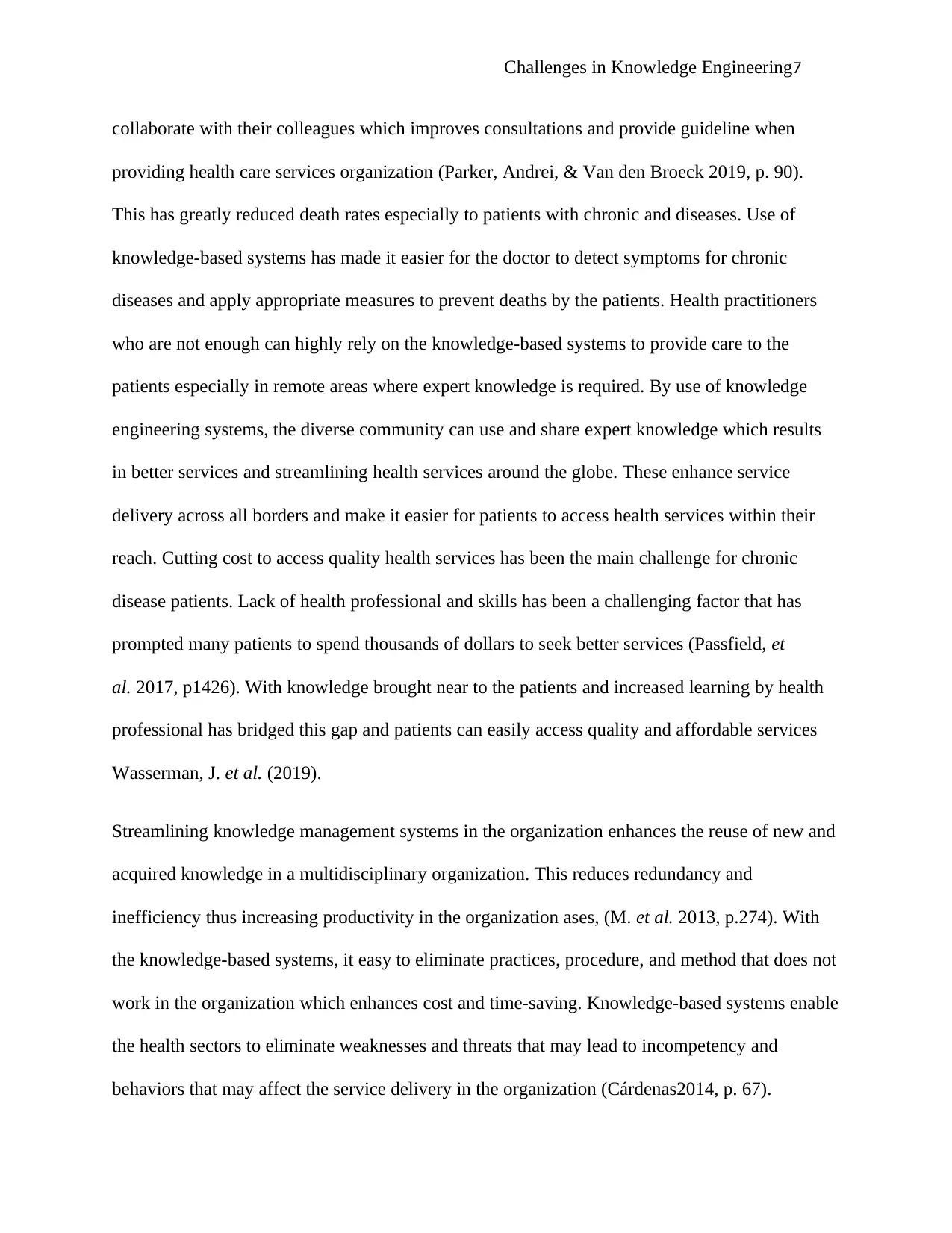
Challenges in Knowledge Engineering7
collaborate with their colleagues which improves consultations and provide guideline when
providing health care services organization (Parker, Andrei, & Van den Broeck 2019, p. 90).
This has greatly reduced death rates especially to patients with chronic and diseases. Use of
knowledge-based systems has made it easier for the doctor to detect symptoms for chronic
diseases and apply appropriate measures to prevent deaths by the patients. Health practitioners
who are not enough can highly rely on the knowledge-based systems to provide care to the
patients especially in remote areas where expert knowledge is required. By use of knowledge
engineering systems, the diverse community can use and share expert knowledge which results
in better services and streamlining health services around the globe. These enhance service
delivery across all borders and make it easier for patients to access health services within their
reach. Cutting cost to access quality health services has been the main challenge for chronic
disease patients. Lack of health professional and skills has been a challenging factor that has
prompted many patients to spend thousands of dollars to seek better services (Passfield, et
al. 2017, p1426). With knowledge brought near to the patients and increased learning by health
professional has bridged this gap and patients can easily access quality and affordable services
Wasserman, J. et al. (2019).
Streamlining knowledge management systems in the organization enhances the reuse of new and
acquired knowledge in a multidisciplinary organization. This reduces redundancy and
inefficiency thus increasing productivity in the organization ases, (M. et al. 2013, p.274). With
the knowledge-based systems, it easy to eliminate practices, procedure, and method that does not
work in the organization which enhances cost and time-saving. Knowledge-based systems enable
the health sectors to eliminate weaknesses and threats that may lead to incompetency and
behaviors that may affect the service delivery in the organization (Cárdenas2014, p. 67).
collaborate with their colleagues which improves consultations and provide guideline when
providing health care services organization (Parker, Andrei, & Van den Broeck 2019, p. 90).
This has greatly reduced death rates especially to patients with chronic and diseases. Use of
knowledge-based systems has made it easier for the doctor to detect symptoms for chronic
diseases and apply appropriate measures to prevent deaths by the patients. Health practitioners
who are not enough can highly rely on the knowledge-based systems to provide care to the
patients especially in remote areas where expert knowledge is required. By use of knowledge
engineering systems, the diverse community can use and share expert knowledge which results
in better services and streamlining health services around the globe. These enhance service
delivery across all borders and make it easier for patients to access health services within their
reach. Cutting cost to access quality health services has been the main challenge for chronic
disease patients. Lack of health professional and skills has been a challenging factor that has
prompted many patients to spend thousands of dollars to seek better services (Passfield, et
al. 2017, p1426). With knowledge brought near to the patients and increased learning by health
professional has bridged this gap and patients can easily access quality and affordable services
Wasserman, J. et al. (2019).
Streamlining knowledge management systems in the organization enhances the reuse of new and
acquired knowledge in a multidisciplinary organization. This reduces redundancy and
inefficiency thus increasing productivity in the organization ases, (M. et al. 2013, p.274). With
the knowledge-based systems, it easy to eliminate practices, procedure, and method that does not
work in the organization which enhances cost and time-saving. Knowledge-based systems enable
the health sectors to eliminate weaknesses and threats that may lead to incompetency and
behaviors that may affect the service delivery in the organization (Cárdenas2014, p. 67).
Paraphrase This Document
Need a fresh take? Get an instant paraphrase of this document with our AI Paraphraser
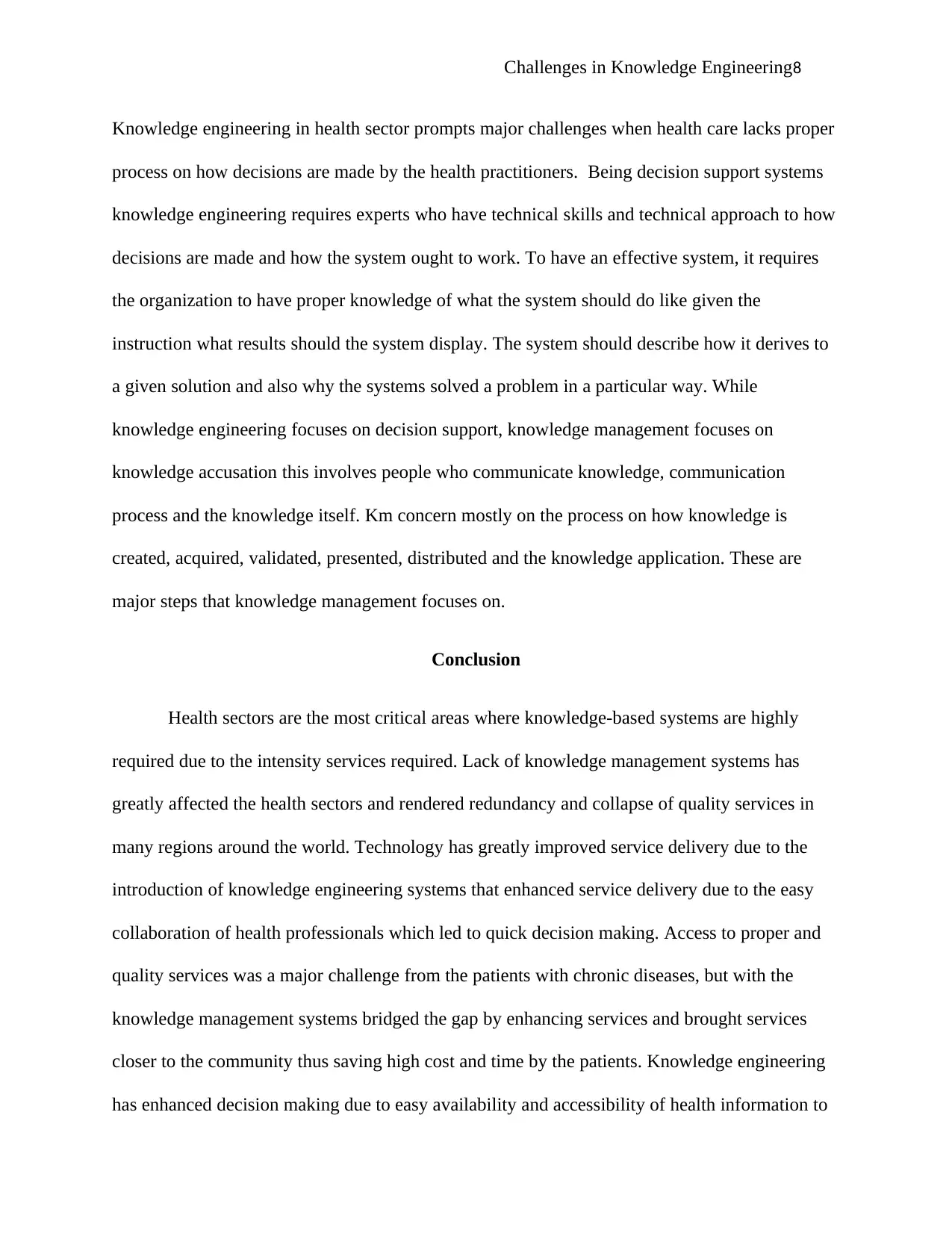
Challenges in Knowledge Engineering8
Knowledge engineering in health sector prompts major challenges when health care lacks proper
process on how decisions are made by the health practitioners. Being decision support systems
knowledge engineering requires experts who have technical skills and technical approach to how
decisions are made and how the system ought to work. To have an effective system, it requires
the organization to have proper knowledge of what the system should do like given the
instruction what results should the system display. The system should describe how it derives to
a given solution and also why the systems solved a problem in a particular way. While
knowledge engineering focuses on decision support, knowledge management focuses on
knowledge accusation this involves people who communicate knowledge, communication
process and the knowledge itself. Km concern mostly on the process on how knowledge is
created, acquired, validated, presented, distributed and the knowledge application. These are
major steps that knowledge management focuses on.
Conclusion
Health sectors are the most critical areas where knowledge-based systems are highly
required due to the intensity services required. Lack of knowledge management systems has
greatly affected the health sectors and rendered redundancy and collapse of quality services in
many regions around the world. Technology has greatly improved service delivery due to the
introduction of knowledge engineering systems that enhanced service delivery due to the easy
collaboration of health professionals which led to quick decision making. Access to proper and
quality services was a major challenge from the patients with chronic diseases, but with the
knowledge management systems bridged the gap by enhancing services and brought services
closer to the community thus saving high cost and time by the patients. Knowledge engineering
has enhanced decision making due to easy availability and accessibility of health information to
Knowledge engineering in health sector prompts major challenges when health care lacks proper
process on how decisions are made by the health practitioners. Being decision support systems
knowledge engineering requires experts who have technical skills and technical approach to how
decisions are made and how the system ought to work. To have an effective system, it requires
the organization to have proper knowledge of what the system should do like given the
instruction what results should the system display. The system should describe how it derives to
a given solution and also why the systems solved a problem in a particular way. While
knowledge engineering focuses on decision support, knowledge management focuses on
knowledge accusation this involves people who communicate knowledge, communication
process and the knowledge itself. Km concern mostly on the process on how knowledge is
created, acquired, validated, presented, distributed and the knowledge application. These are
major steps that knowledge management focuses on.
Conclusion
Health sectors are the most critical areas where knowledge-based systems are highly
required due to the intensity services required. Lack of knowledge management systems has
greatly affected the health sectors and rendered redundancy and collapse of quality services in
many regions around the world. Technology has greatly improved service delivery due to the
introduction of knowledge engineering systems that enhanced service delivery due to the easy
collaboration of health professionals which led to quick decision making. Access to proper and
quality services was a major challenge from the patients with chronic diseases, but with the
knowledge management systems bridged the gap by enhancing services and brought services
closer to the community thus saving high cost and time by the patients. Knowledge engineering
has enhanced decision making due to easy availability and accessibility of health information to
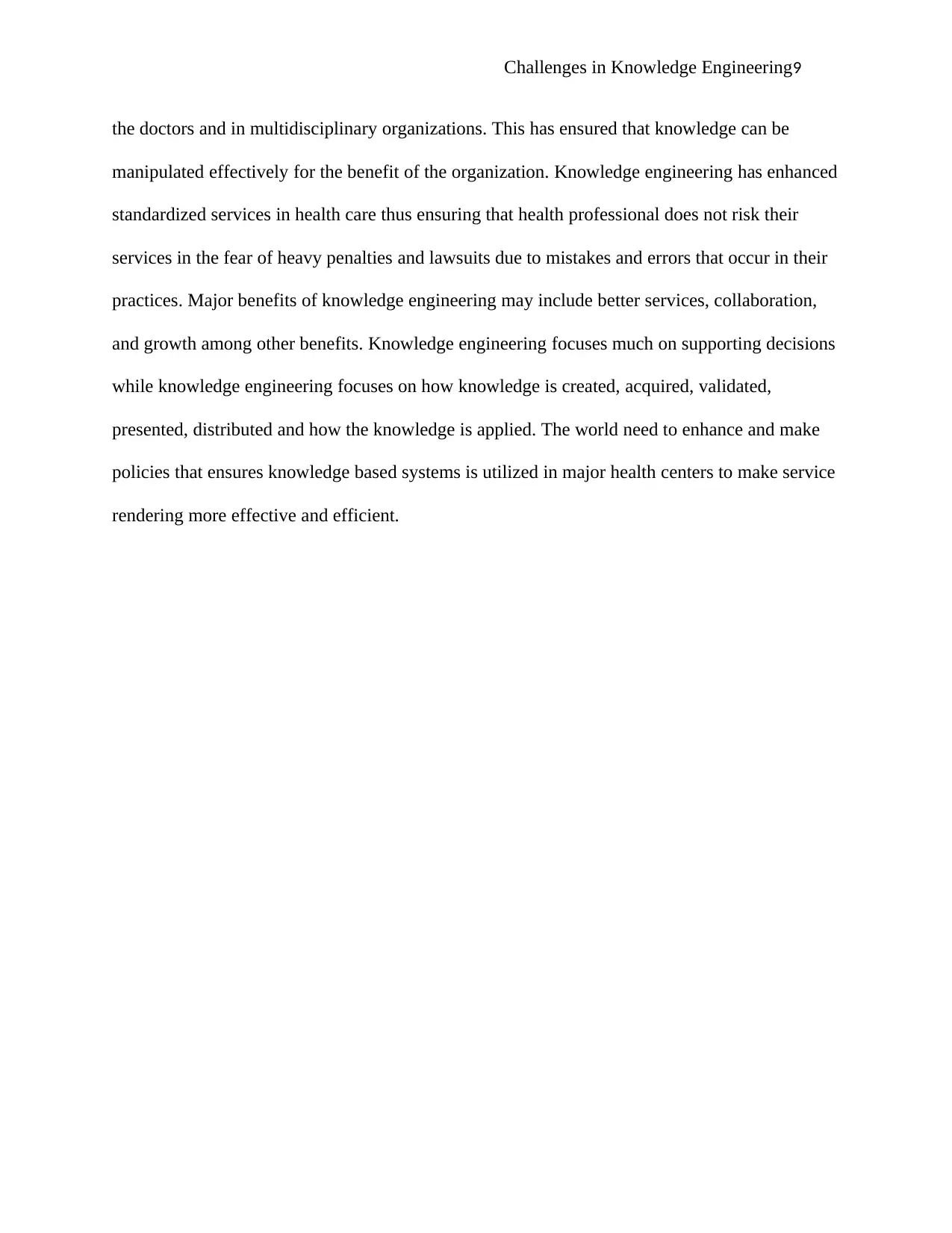
Challenges in Knowledge Engineering9
the doctors and in multidisciplinary organizations. This has ensured that knowledge can be
manipulated effectively for the benefit of the organization. Knowledge engineering has enhanced
standardized services in health care thus ensuring that health professional does not risk their
services in the fear of heavy penalties and lawsuits due to mistakes and errors that occur in their
practices. Major benefits of knowledge engineering may include better services, collaboration,
and growth among other benefits. Knowledge engineering focuses much on supporting decisions
while knowledge engineering focuses on how knowledge is created, acquired, validated,
presented, distributed and how the knowledge is applied. The world need to enhance and make
policies that ensures knowledge based systems is utilized in major health centers to make service
rendering more effective and efficient.
the doctors and in multidisciplinary organizations. This has ensured that knowledge can be
manipulated effectively for the benefit of the organization. Knowledge engineering has enhanced
standardized services in health care thus ensuring that health professional does not risk their
services in the fear of heavy penalties and lawsuits due to mistakes and errors that occur in their
practices. Major benefits of knowledge engineering may include better services, collaboration,
and growth among other benefits. Knowledge engineering focuses much on supporting decisions
while knowledge engineering focuses on how knowledge is created, acquired, validated,
presented, distributed and how the knowledge is applied. The world need to enhance and make
policies that ensures knowledge based systems is utilized in major health centers to make service
rendering more effective and efficient.
⊘ This is a preview!⊘
Do you want full access?
Subscribe today to unlock all pages.

Trusted by 1+ million students worldwide
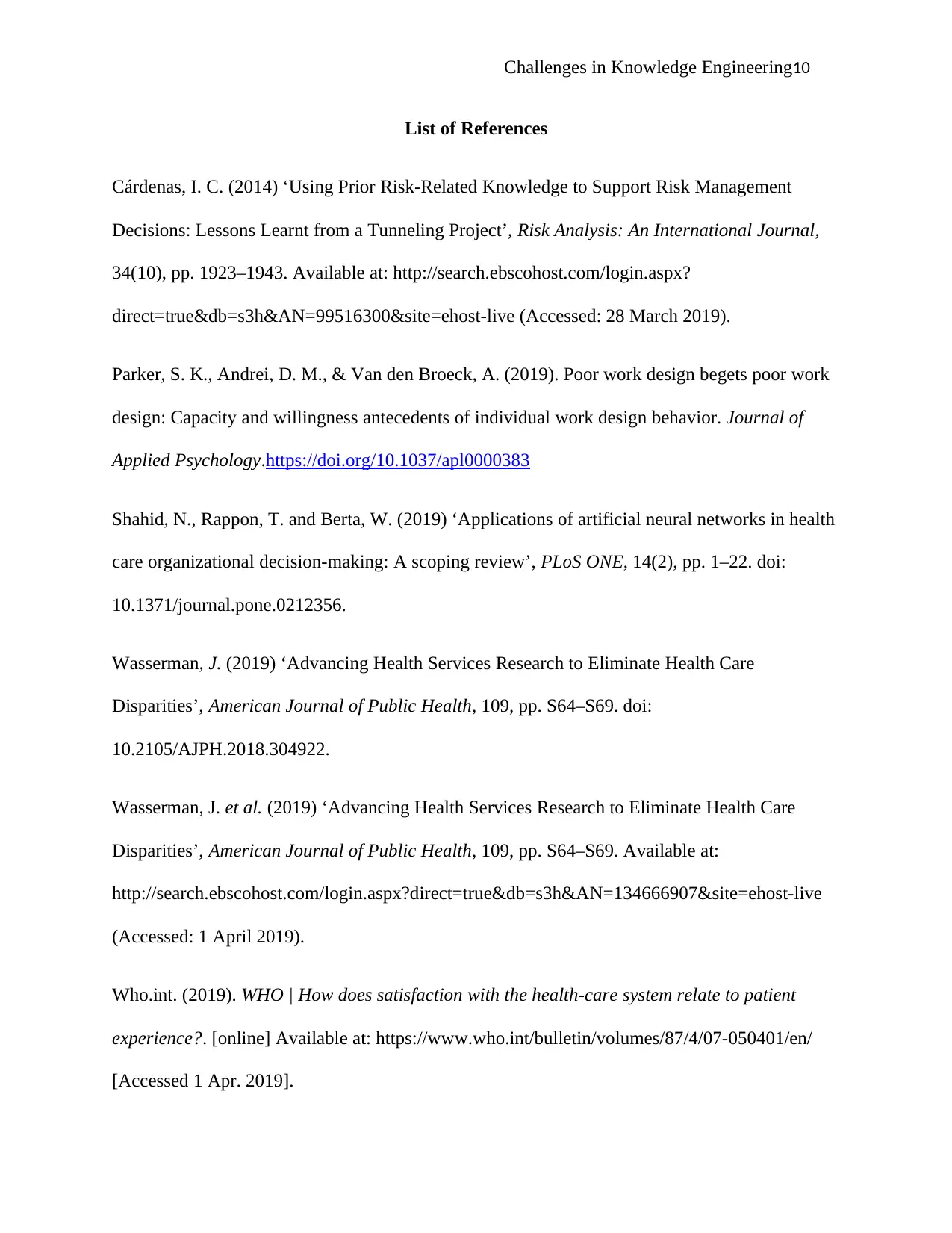
Challenges in Knowledge Engineering10
List of References
Cárdenas, I. C. (2014) ‘Using Prior Risk-Related Knowledge to Support Risk Management
Decisions: Lessons Learnt from a Tunneling Project’, Risk Analysis: An International Journal,
34(10), pp. 1923–1943. Available at: http://search.ebscohost.com/login.aspx?
direct=true&db=s3h&AN=99516300&site=ehost-live (Accessed: 28 March 2019).
Parker, S. K., Andrei, D. M., & Van den Broeck, A. (2019). Poor work design begets poor work
design: Capacity and willingness antecedents of individual work design behavior. Journal of
Applied Psychology.https://doi.org/10.1037/apl0000383
Shahid, N., Rappon, T. and Berta, W. (2019) ‘Applications of artificial neural networks in health
care organizational decision-making: A scoping review’, PLoS ONE, 14(2), pp. 1–22. doi:
10.1371/journal.pone.0212356.
Wasserman, J. (2019) ‘Advancing Health Services Research to Eliminate Health Care
Disparities’, American Journal of Public Health, 109, pp. S64–S69. doi:
10.2105/AJPH.2018.304922.
Wasserman, J. et al. (2019) ‘Advancing Health Services Research to Eliminate Health Care
Disparities’, American Journal of Public Health, 109, pp. S64–S69. Available at:
http://search.ebscohost.com/login.aspx?direct=true&db=s3h&AN=134666907&site=ehost-live
(Accessed: 1 April 2019).
Who.int. (2019). WHO | How does satisfaction with the health-care system relate to patient
experience?. [online] Available at: https://www.who.int/bulletin/volumes/87/4/07-050401/en/
[Accessed 1 Apr. 2019].
List of References
Cárdenas, I. C. (2014) ‘Using Prior Risk-Related Knowledge to Support Risk Management
Decisions: Lessons Learnt from a Tunneling Project’, Risk Analysis: An International Journal,
34(10), pp. 1923–1943. Available at: http://search.ebscohost.com/login.aspx?
direct=true&db=s3h&AN=99516300&site=ehost-live (Accessed: 28 March 2019).
Parker, S. K., Andrei, D. M., & Van den Broeck, A. (2019). Poor work design begets poor work
design: Capacity and willingness antecedents of individual work design behavior. Journal of
Applied Psychology.https://doi.org/10.1037/apl0000383
Shahid, N., Rappon, T. and Berta, W. (2019) ‘Applications of artificial neural networks in health
care organizational decision-making: A scoping review’, PLoS ONE, 14(2), pp. 1–22. doi:
10.1371/journal.pone.0212356.
Wasserman, J. (2019) ‘Advancing Health Services Research to Eliminate Health Care
Disparities’, American Journal of Public Health, 109, pp. S64–S69. doi:
10.2105/AJPH.2018.304922.
Wasserman, J. et al. (2019) ‘Advancing Health Services Research to Eliminate Health Care
Disparities’, American Journal of Public Health, 109, pp. S64–S69. Available at:
http://search.ebscohost.com/login.aspx?direct=true&db=s3h&AN=134666907&site=ehost-live
(Accessed: 1 April 2019).
Who.int. (2019). WHO | How does satisfaction with the health-care system relate to patient
experience?. [online] Available at: https://www.who.int/bulletin/volumes/87/4/07-050401/en/
[Accessed 1 Apr. 2019].
Paraphrase This Document
Need a fresh take? Get an instant paraphrase of this document with our AI Paraphraser
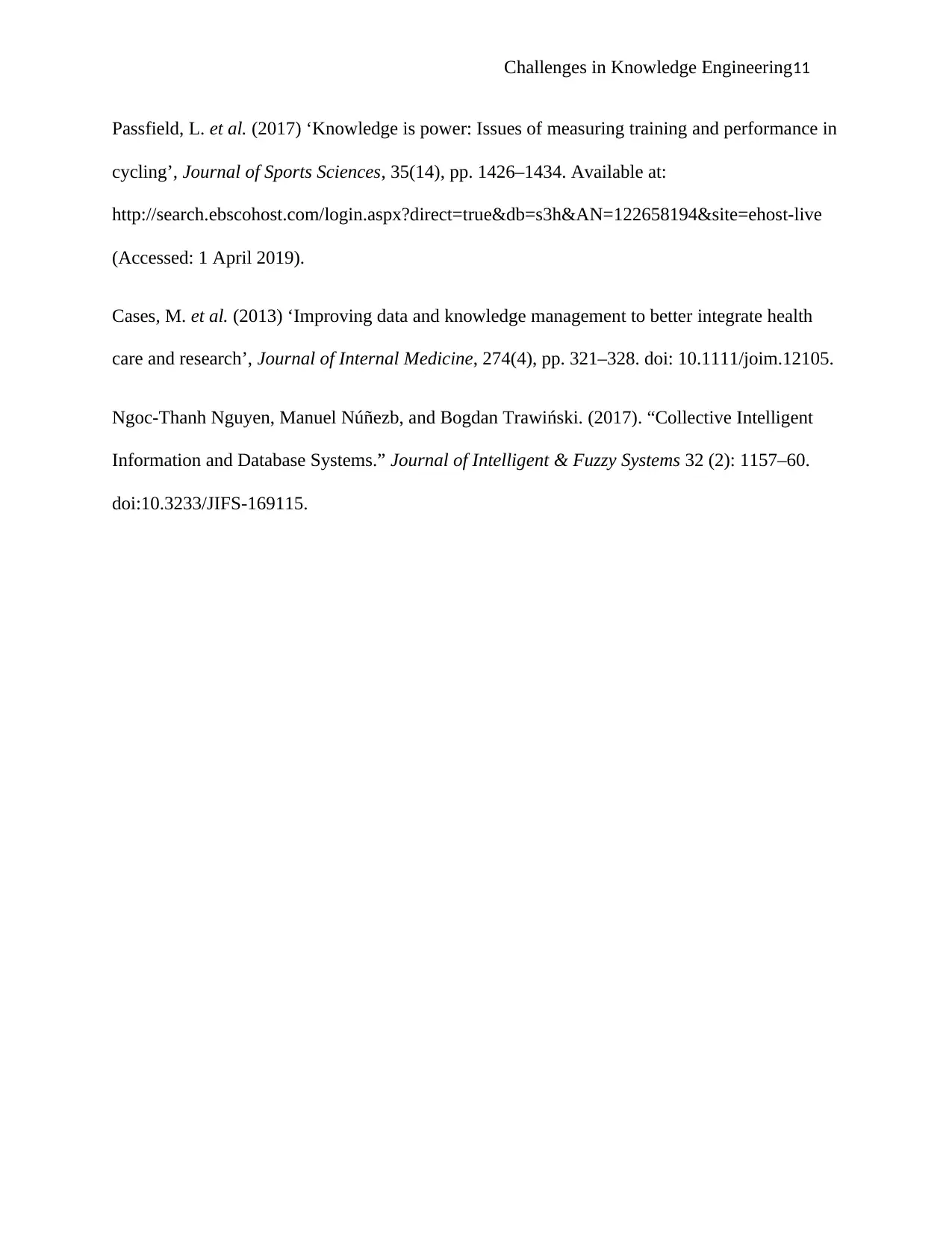
Challenges in Knowledge Engineering11
Passfield, L. et al. (2017) ‘Knowledge is power: Issues of measuring training and performance in
cycling’, Journal of Sports Sciences, 35(14), pp. 1426–1434. Available at:
http://search.ebscohost.com/login.aspx?direct=true&db=s3h&AN=122658194&site=ehost-live
(Accessed: 1 April 2019).
Cases, M. et al. (2013) ‘Improving data and knowledge management to better integrate health
care and research’, Journal of Internal Medicine, 274(4), pp. 321–328. doi: 10.1111/joim.12105.
Ngoc-Thanh Nguyen, Manuel Núñezb, and Bogdan Trawiński. (2017). “Collective Intelligent
Information and Database Systems.” Journal of Intelligent & Fuzzy Systems 32 (2): 1157–60.
doi:10.3233/JIFS-169115.
Passfield, L. et al. (2017) ‘Knowledge is power: Issues of measuring training and performance in
cycling’, Journal of Sports Sciences, 35(14), pp. 1426–1434. Available at:
http://search.ebscohost.com/login.aspx?direct=true&db=s3h&AN=122658194&site=ehost-live
(Accessed: 1 April 2019).
Cases, M. et al. (2013) ‘Improving data and knowledge management to better integrate health
care and research’, Journal of Internal Medicine, 274(4), pp. 321–328. doi: 10.1111/joim.12105.
Ngoc-Thanh Nguyen, Manuel Núñezb, and Bogdan Trawiński. (2017). “Collective Intelligent
Information and Database Systems.” Journal of Intelligent & Fuzzy Systems 32 (2): 1157–60.
doi:10.3233/JIFS-169115.
1 out of 11
Related Documents
Your All-in-One AI-Powered Toolkit for Academic Success.
+13062052269
info@desklib.com
Available 24*7 on WhatsApp / Email
![[object Object]](/_next/static/media/star-bottom.7253800d.svg)
Unlock your academic potential
Copyright © 2020–2026 A2Z Services. All Rights Reserved. Developed and managed by ZUCOL.





